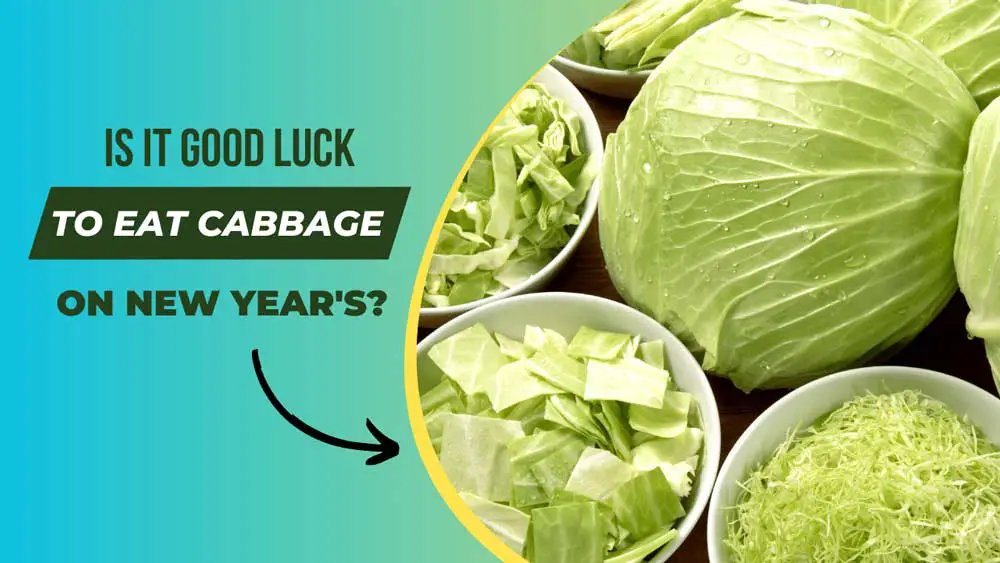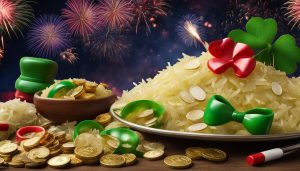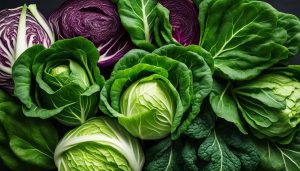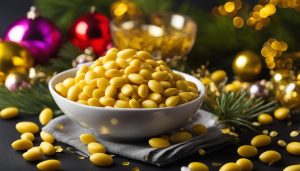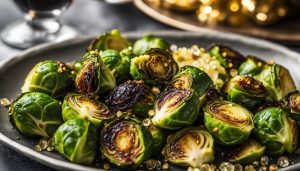Have you ever wondered why cabbage suddenly becomes a hot commodity on New Year’s Eve? Well, it turns out that this humble vegetable is more than just a side dish; it’s a symbol of good luck and prosperity.
Eating cabbage on New Year’s is believed to bring wealth and success for the year ahead. But is it just a myth, or is there some truth to this superstition? In this blog post, we’ll explore the origins of this tradition and examine whether there’s any scientific evidence to support it.
So, grab a fork and join us as we delve into the world of New Year’s cabbage and uncover the truth behind this age-old superstition.
Contents
- 1 The Tradition of Eating Cabbage on New Year’s: Origins, Variations, and Beliefs
- 2 Is it Good Luck to eat Cabbage on new year’s?
- 3 Conclusion
- 4 FAQs
- 4.1 Is it okay to eat cabbage in any form on New Year’s Day?
- 4.2 What if I don’t like cabbage?
- 4.3 Do different cultures have different beliefs about cabbage and good luck?
- 4.4 What is the history behind the tradition of eating cabbage on New Year’s?
- 4.5 Does eating cabbage on New Year’s bring good luck?
The Tradition of Eating Cabbage on New Year’s: Origins, Variations, and Beliefs

Eating cabbage on New Year’s has been a long-standing tradition in many parts of the world. The origin of this custom can be traced back to ancient times when people believed in the power of food to bring good luck and fortune.
In some cultures, the round shape of the cabbage symbolizes the coming full circle of the old year and the beginning of a new cycle. In other cultures, the color green represents wealth and prosperity. Whatever the reason, the tradition of eating cabbage on New Year’s has endured for centuries.
Also read: Is it good luck to see a bald eagle?
Regional Variations and Cultural Significance of Eating Cabbage on New Year’s:
While the tradition of eating cabbage on New Year’s is widespread, regional variations exist in how it’s prepared and consumed. In some parts of the world, cabbage is eaten raw; in others, it’s boiled, pickled, or fried.
In the United States, for example, it’s common to eat sauerkraut on New Year’s Day, while in Japan, cabbage is often served as a part of a traditional New Year’s feast. The cultural significance of cabbage also varies, with some cultures viewing it as a symbol of luck and prosperity, while others associate it with health and wellness.
Religious and Spiritual Beliefs Associated with Eating Cabbage on New Year’s:
In addition to its cultural significance, eating cabbage on New Year’s is also tied to religious and spiritual beliefs in some cultures. In many Eastern European countries, for example, it’s believed that eating cabbage on New Year’s will bring good luck and fortune in the coming year.
Some people even go so far as to place a few cabbage leaves in their wallets or purse to ensure financial prosperity. Similarly, in some Asian cultures, cabbage is considered a sacred vegetable believed to ward off evil spirits and bring good fortune.
Regardless of the specific belief, the tradition of eating cabbage on New Year’s is deeply rooted in history and culture and continues to be practiced worldwide today.
Is it Good Luck to eat Cabbage on new year’s?
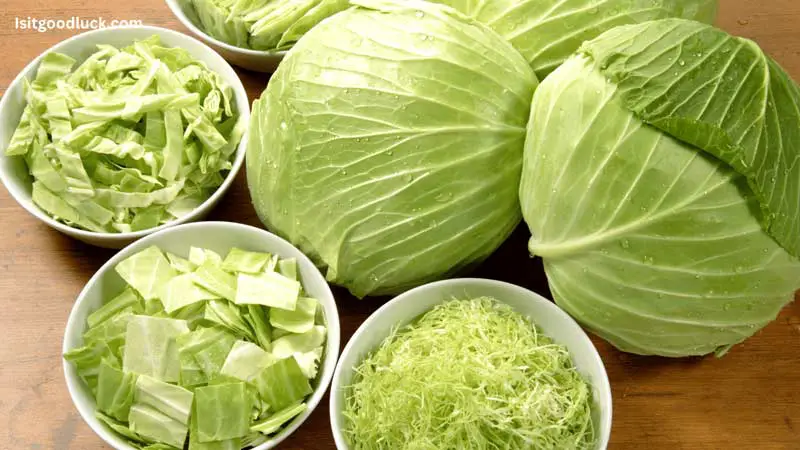
Cabbage has long been associated with wealth and good fortune, making it a popular food on New Year’s Day. The belief is that one will have a prosperous year by consuming Cabbage. The round shape of Cabbage is also thought to represent coins or wealth, further emphasizing its symbolic importance in New Year’s traditions.
In some cultures, it’s believed that the more Cabbage you eat on New Year’s Day, the greater your financial success will be in the coming year.
Also read: Is it good luck to see a fox?
Other Symbolic Meanings of Cabbage in Different Cultures:
While Cabbage is primarily associated with prosperity and good luck, it also holds other symbolic meanings in different cultures. In some Asian cultures, Cabbage is believed to represent longevity and health, making it a popular addition to New Year’s feasts.
In Greece, Cabbage is associated with the god of wine, Dionysus, and is often consumed alongside wine during New Year’s celebrations. In Mexico, Cabbage is used to make a traditional New Year’s salad called Ensalada de Noche Buena, which is believed to bring health and happiness to those who consume it.
Connection between Cabbage and Other New Year’s Traditions:
Cabbage is often served alongside other foods that hold symbolic significance in New Year’s traditions. For example, it’s common in the United States to eat Cabbage or sauerkraut alongside pork or ham on New Year’s Day.
This tradition dates back to the early 18th century when German immigrants introduced sauerkraut to the United States. The combination of Cabbage and pork is believed to represent wealth and prosperity, as pigs symbolize progress and forward motion.
Similarly, in some cultures, Cabbage is served with black-eyed peas or lentils, believed to bring luck and wealth in the new year. Whatever the combination of foods, the inclusion of Cabbage in New Year’s traditions serves as a reminder of the symbolic importance of food in bringing good luck and prosperity in the coming year.
The power of belief and positive thinking in New Year’s Traditions:
While no scientific evidence may support the idea that eating cabbage on New Year’s brings good luck, the power of belief and positive thinking should not be underestimated. For many people, eating cabbage on New Year’s is a symbol of hope and optimism for the coming year.
The positive mindset that comes with this belief can be a powerful force in shaping one’s outlook and experiences in the new year. So while superstition may not have a scientific basis, the positive effects of belief and positive thinking should not be dismissed.
Conclusion
In conclusion, the tradition of eating cabbage on New Year’s may have originated as a superstitious belief, but it has become a meaningful and significant tradition for many cultures around the world.
Whether or not cabbage truly brings good luck in the new year is debatable, but the act of participating in this tradition can bring a sense of hope and positivity for the future. At its core, the tradition of eating cabbage on New Year’s is a reminder of the power of belief and positive thinking.
So whether you choose to eat cabbage on New Year’s Day or not, remember to approach the new year with a sense of hope, optimism, and a belief in the potential for a prosperous and fulfilling year ahead.
Also read other articles regarding foods good luck
FAQs
Is it okay to eat cabbage in any form on New Year’s Day?
Yes, you can eat cabbage in any form on New Year’s Day, such as sauerkraut, coleslaw, or stuffed cabbage. The important thing is to incorporate cabbage into your meal in some way to symbolize good luck and prosperity.
What if I don’t like cabbage?
Can I eat something else for good luck? While cabbage is the traditional food associated with good luck on New Year’s Day, other foods are believed to bring prosperity, such as lentils, black-eyed peas, and grapes. You can choose to eat any of these foods instead of cabbage.
Do different cultures have different beliefs about cabbage and good luck?
Yes, different cultures have different beliefs about cabbage and good luck. In some cultures, cabbage is believed to bring good luck because its green color symbolizes money and wealth. In others, cabbage is believed to bring good luck because its round shape symbolizes completeness and wholeness.
What is the history behind the tradition of eating cabbage on New Year’s?
The history behind the tradition of eating cabbage on New Year’s is unclear, but it is believed to have originated in Europe in the Middle Ages. Cabbage was a staple food in winter and often one of the few fresh vegetables available in the colder months. Over time, the tradition of eating cabbage on New Year’s evolved into a symbol of good luck and prosperity.
Does eating cabbage on New Year’s bring good luck?
No scientific evidence supports the idea that eating cabbage on New Year’s Day brings good luck. However, the tradition has been passed down through generations and has become a meaningful tradition for many cultures worldwide. The positive mindset and sense of hope that comes with participating in this tradition can be a powerful force in shaping one’s outlook and experiences in the new year.

